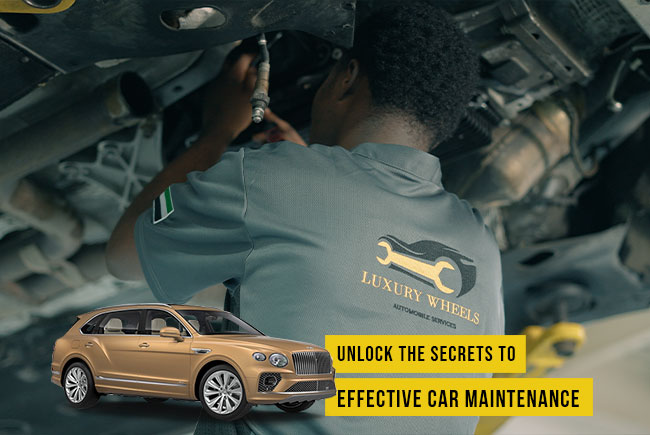
Table of Contents
Car maintenance is not just about keeping your vehicle looking good—it's about ensuring its longevity, safety, and efficiency. Maintaining your car regularly can avoid costly repairs, extend its lifespan, and ensure it runs smoothly. This article will unlock the secrets to effective car maintenance, offering valuable tips to save you money and keep your car in good condition.
Why Car Maintenance is Crucial
Your car is one of the most expensive investments you'll make, and keeping it well-maintained is vital to getting the most out of it. Regular maintenance helps prevent major breakdowns, improves fuel efficiency, and ensures the safety of everyone in the vehicle. By staying on top of essential maintenance tasks, you also improve the resale value of your car.
Understanding Car Maintenance
What Does Car Maintenance Include?
Car maintenance involves various tasks to keep your vehicle in optimal working condition. These tasks include routine inspections, fluid changes, and addressing any issues that arise to prevent costly repairs in the future.
Preventive Maintenance vs. Reactive Maintenance
Preventive maintenance is all about staying ahead of potential issues. Regularly servicing your car and addressing problems before they become serious can save time, money, and frustration. Reactive maintenance, on the other hand, occurs after a problem has already happened, often resulting in higher repair costs.
Why Preventive Maintenance Saves Money
By taking preventive measures, you proactively prevent major breakdowns, which can be much more expensive than regular service checks. For example, a simple oil change can prevent engine wear, saving you from replacing the entire engine later.
Top 10 Car Maintenance Tips
1. Regular Oil Changes
Oil lubricates the engine and ensures that the moving parts work smoothly. Over time, the oil can break down, reducing its effectiveness. Changing the oil regularly (every 3,000 to 5,000 miles) is one of your vehicle's most important maintenance tasks.
2. Tire Care and Rotation
Tires are one of the most essential parts of your vehicle, providing the traction needed for safe driving. Ensure your tires are properly inflated, as underinflated tires can wear unevenly and affect your car's handling. Regular tire rotation ensures even wear and extends the lifespan of your tires.
3. Check Your Brakes Regularly
Brakes are crucial for your safety. Check your brakes at least once a year and replace the brake pads if necessary. If you notice unusual noises or vibrations, check your brakes immediately.
4. Keep the Battery in Check
A dead battery is one of the most common reasons cars break down. Check the battery terminals for corrosion and ensure that the battery is charged. Replace the battery every 3 to 5 years to prevent unexpected failures.
5. Air Filter Replacement
The air filter keeps debris from entering your engine. A clogged air filter can reduce engine efficiency and performance. Replacing the air filter every 12,000 miles or once a year is recommended.
6. Monitor Your Car's Fluids
Your vehicle relies on several key fluids to operate smoothly, including engine oil, transmission fluid, brake fluid, and coolant. Check these fluids regularly and top them off if necessary.
7. Brake Fluid and Coolant Checks
Check your brake fluid and coolant levels regularly. Low levels of these fluids can lead to brake failure or engine overheating. Always make sure they are at the proper levels to avoid serious issues.
8. Keep the Exterior Clean and Waxed
Washing your car regularly prevents dirt, road salt, and other contaminants from damaging the paint and causing rust. Waxing your vehicle protects the paint and adds a layer of defense against the elements.
9. Proper Storage for Seasonal Maintenance
If you live in an area with extreme seasonal changes, take extra care of your vehicle during these times. Prepare it for winter by checking the antifreeze levels and ensuring the air conditioning works properly for summer.
10. Timing Belt and Water Pump Maintenance
The timing belt and water pump are crucial components of your car's engine. A worn-out timing belt can lead to engine failure. Replace the timing belt at the manufacturer's recommended interval to avoid a costly repair.
Understanding Your Car's Manual
Every car comes with an owner's manual that provides specific maintenance schedules, recommended service intervals, and details on the type of parts and fluids your car needs. Reading and following your car's manual is the best way to stay on top of maintenance tasks.
Seasonal Car Maintenance
Preparing Your Car for Winter
Winter weather can be harsh on your vehicle, with cold temperatures affecting battery life, tire pressure, and engine performance. Ensure your car's antifreeze is at the right level, check your tires for winter readiness, and inspect the brakes to avoid accidents on icy roads.
Preparing Your Car for Summer
Hot weather can lead to overheating, so check your car's cooling system, including the radiator and coolant levels. Also, inspect the tires for wear and ensure the air conditioning works effectively.
How to Spot Car Problems Early
Recognizing the Warning Signs
Keeping an eye on your car's performance can help you spot problems before they become serious. Warning lights on the dashboard, unusual noises, or changes in how your car drives can indicate an underlying issue.
Listen to Your Car
Different sounds can tell you a lot about your car's condition. A squealing noise when braking may indicate worn brake pads, while a knocking noise from the engine could suggest oil issues.
Visual Inspections
Regularly inspect your car for leaks, worn-out tires, or damaged components. Early detection of these issues can save money and prevent them from becoming bigger problems.
Expert Tips for Car Longevity
Taking care of your car extends its lifespan and ensures you get the most out of your investment. Regular maintenance is essential, but driving habits matter, too. Avoid sudden starts and stops, and try to drive at moderate speeds to reduce wear and tear on the vehicle.
Conclusion
Regular car maintenance ensures your vehicle runs efficiently, lasts longer, and performs safely. By following these expert tips and taking proactive steps, you can avoid costly repairs and enjoy a smooth ride for years. For all your luxury car maintenance needs, trust the experts at Luxury Wheels. Start implementing these tips today, and your car will thank you!





